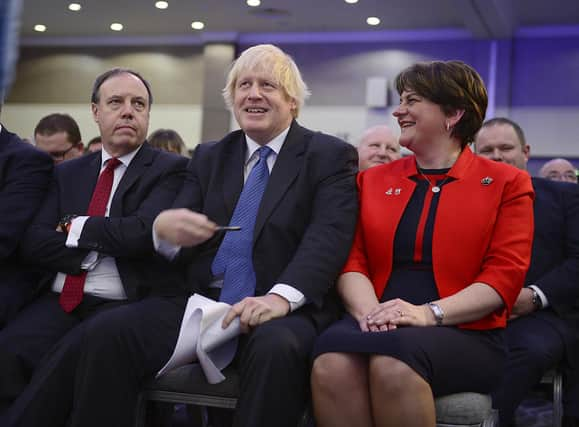Economist: The EU has moved a long way but has not given up its control over much of NI economy - even so DUP might be best to go back


•The Windsor Agreement may fall well short of their demands, but gains have been made including making life a lot easier for trade across the Irish Sea.
The leaders of Sinn Fein, the SDLP Alliance and Green parties who called in July 2020 for the rigorous implementation of the protocol, now agree with the DUP that change was needed and welcome the considerable changes that have been made.
Advertisement
Hide AdAdvertisement
Hide AdBoris Johnson’s Protocol Bill, which would have allowed UK ministers to override the protocol, added to the pressure exerted by the DUP. This bill clearly worried the EU which has agreed reforms to the protocol to ensure that the bill will now be scrapped. The fact that the UK had a strong bottom line meant that the recent negotiations were meaningful.


In any case the EU were keen to move on. As Ursula von der Leyen put it in the press conference, the EU and EU share basic values and need to co-operate over Ukraine, climate change and other important issues. Running sores like the protocol had become an unnecessary impediment, now that the EU has recovered from its funk over the acrimonious Brexit divorce.
The EU has moved a long way but let’s be clear, it has not given up its control over much of the NI economy. Lord Frost and Boris Johnson aimed to roll back EU law in the protocol and replace it with UK law. While the Windsor deal softens the application of the protocol, it does not change, indeed it arguably increases, the scope of EU law.
The new command paper claims that the new proposals ‘deliver on the core objectives of Frost’s 2021 command paper’ but this overstates the reality. Trade restrictions have been eased on goods from GB destined solely for consumption in NI, but a form of customs declaration is still required alongside certificates of compliance and checks for food imports. Customs details are even required for parcels from Amazon but the necessary customs data will be supplied by the firm and will be invisible to the individuals making online purchases.
Advertisement
Hide AdAdvertisement
Hide AdThe new easements on trade incorporate the UK’s unilateral grace periods which the EU were previously legally contesting but now agree to make permanent. A major change is that the UK’s Trade Support Service (TSS) will complete the 21-line customs declarations, based on normal commercial data supplied by firms. This what was originally billed as the purpose of the £350 million TSS when it set up two years ago, but it became instead an advisory service.
Derogations and clarifications have made life easier for imports from GB by disapplying a raft of EU regulations but EU law remains in place and the EU reserves the right to remove the concessions if it loses trust in the UK in future.
Importantly, the panoply of EU regulations governing manufacturing and farming inside NI remain in place. Significant parts of the NI economy are governed from Brussels not London. The UK side has made much of the ‘Stormont brake’ by which London can disapply any new EU regulations on firms in NI but only, it seems, in extreme circumstances.
Existing regulations will continue to apply even if the UK changes regulations in GB. If for instance genetically-modified flour was allowed in GB, it could be used in cakes sent to NI marked as not for sale in the EU. The flour could not, however, be used by bakers in NI as long as EU prohibitions remained in force. This could put NI producers at a disadvantage selling into markets in GB and indeed also those in NI. Future divergence from the UK is likely to cause increasing frictions unless the UK is able to challenge existing as well as future EU regulations.
Advertisement
Hide AdAdvertisement
Hide AdIt seems likely however that few such UK divergences are planned. Instead, the UK will probably march in step with EU reforms, many of which in any case reflect global agreements. Most NI firms will not object to the retention of these regulations since they allow companies to retain their advantage in having customs-free access into EU markets. They will argue that the previous ‘price’ of this benefit in higher import costs has been reduced by the new trade arrangements.
The EU will now allow a range of previously prescribed goods like chilled meats into NI. However, the new rules will be little noticed by consumers in NI since proscribed goods, medicines and parcels were already reaching NI due to the grace periods. The advantage is that the grace period easements are now mutually agreed and cease to be a legal sore. The reduction in customs administration should reduce prices by a few per cent but the gains will not be identifiable among the many other inflationary pressures.
What should the DUP do now? Some will argue for further concessions but substantial changes will not be forthcoming. The choice is agonising and there are no good options but the best bet may be to accept what is on offer as a partial advance while continuing to campaign to remove EU law altogether. The ongoing campaign could be pursued inside the Stormont assembly and executive. The next stage in this campaign can come in 2024 when the existing protocol provides for an assembly vote on whether the protocol should survive. The DUP will need to persuade other local parties to support major improvements to the Windsor deal.
This will be difficult but is not impossible and will depend on future events.
• Dr Graham Gudgin is chief economic advisor at Policy Echange think tank and former special advisor to First Minister David Trimble